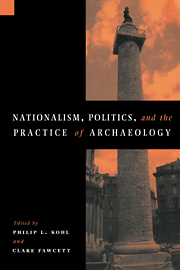Book contents
- Frontmatter
- Contents
- List of maps
- List of contributors
- Acknowledgments
- Part I Introduction
- Part II Western Europe
- Part III Eastern Europe and Eurasia
- Part IV East Asia
- 11 Thirty years of Chinese archaeology (1949–1979)
- 12 The regionalist paradigm in Chinese archaeology
- 13 The politics of ethnicity in prehistoric Korea
- 14 Nationalism and postwar Japanese archaeology
- Part V Commentary
- Bibliography
- Index
11 - Thirty years of Chinese archaeology (1949–1979)
Published online by Cambridge University Press: 06 October 2009
- Frontmatter
- Contents
- List of maps
- List of contributors
- Acknowledgments
- Part I Introduction
- Part II Western Europe
- Part III Eastern Europe and Eurasia
- Part IV East Asia
- 11 Thirty years of Chinese archaeology (1949–1979)
- 12 The regionalist paradigm in Chinese archaeology
- 13 The politics of ethnicity in prehistoric Korea
- 14 Nationalism and postwar Japanese archaeology
- Part V Commentary
- Bibliography
- Index
Summary
Science is a cause fighting for truth.
One must be free of fear, even of offending God.
Li Shu (1985:25)Chinese archaeology was characterized by numerous discoveries and significant research during the thirty years from 1949, the year of the founding of the People's Republic of China, to 1979, the year the Chinese Communist Party held its Third Plenary Session of the Eleventh Central Committee and began to correct the “leftist” errors of Mao Zedong. Compared to the period prior to 1949, many achievements are evident: archaeological excavations expanded into every area of the country, compiling abundant new data that filled in many historical gaps; the adoption of new techniques, such as C 14 dating, provided invaluable new insights into the prehistoric record; the training of younger archaeologists and the establishment of archaeological museums and institutes in each province provided proper conditions for the storage and study of newly unearthed antiquities; and the opening of a special publishing facility (Wenwu Publishing House) and the printing of several archaeological periodicals guaranteed the publication of important data. In addition, being a socialist country in which all the land belongs to the state, China owns all the antiquities and ancient remains on or under the ground. During the period under discussion, the Antiquity law, which prohibited the export of antiquities, was very strict and efficiently enforced by the police and customs offices.
- Type
- Chapter
- Information
- Nationalism, Politics and the Practice of Archaeology , pp. 177 - 197Publisher: Cambridge University PressPrint publication year: 1996
- 5
- Cited by

